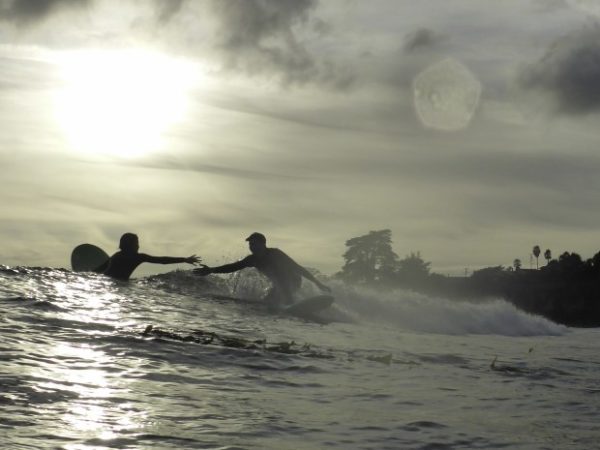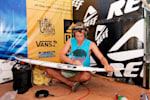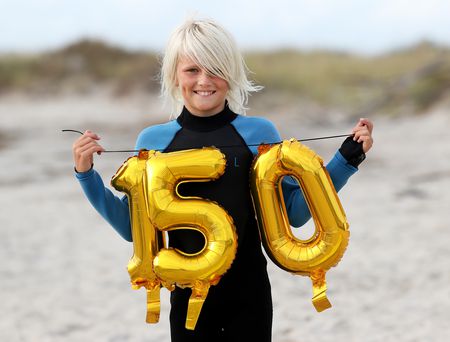EDITOR’S NOTE: Author Michael Allen serves as director of Pleasure Point Surf Club.
PLEASURE POINT — For more than 100 years, Boys & Girls Club of America has provided children a nurturing, guiding path towards becoming responsible, caring adults. Within the United States, there exist only three surf clubs under the umbrella of the Boys & Girls Club and they are all located along the coast of California: Huntington Beach, Half Moon Bay, and Santa Cruz. In Santa Cruz, it is called the Pleasure Point Surf Club. Each of these clubs operate under directors who share a common philosophy: Get children into the ocean to surf, and build a relationship with the sea.
At the beginning of this season with the Pleasure Point Surf Club, a young boy named William Jackson signed up. Soon after, his father, Jim, notified us about his son’s medical condition, Autoimmune Hemolytic Anemia. Jackson started our program in September 2019, and only four months prior, he was hospitalized by a rare auto-immune disorder. The 14-year-old Scotts Valley Middle School eighth-grader was given two blood transfusions and was prescribed 100mg of Prednisone. The family knew there would be side effects but had no other choice but to proceed with the treatment. His hemoglobin level was at 4 (normal level is 14-16), and, without treatment, his outlook was not good.

I wondered about Jackson’s childhood, how he grew up, what he was involved with. He was an avid sailor, loved the outdoors, went through the Junior Lifeguard program at Seascape and Twin Lakes Beach, but didn’t surf much. He seemed to shy away from any activity that involved competition.
When I first met him, he was quiet, but had a big smile on his face. He greeted me politely, quickly changed into his wetsuit, grabbed his surfboard, and ran down to the beach. He showed excitement and enthusiasm, but what I would soon see with him riding waves, was something even more astonishing.
The 100mg dose of Prednisone saved his life, and his hemoglobin levels were up to 14, but he experienced some side effects at home. The medication seemed to alter his normal relaxed personality making day-to-day events more difficult to deal with.
Dr. Tannie Huang, Jackson’s physician, said: “Will has been on steroids to treat his blood disorder. Steroids depress our mood and amplify our responses to what would usually be minor stresses. For Will, surfing has been a great counter-balance to these side effects and allows him to forget about the stresses of his clinic visits. I am so glad that Will has surfing as an outlet and recognize how much it helps him as a whole person.”
In November, two months into the surfing program, Jackson had a sudden drop in his hemoglobin levels to 7, rapidly losing his red blood cell count which leads to anemia, causing lethargic response. Less energy usually equates to a rapid decline in activity because of the effort involved. He was given another dose of Prednisone as well as Rituxan, which is given to patients with Non-Hodgkin’s Lymphoma (NHL). He went to the clinic four times in November with each treatment lasted 5 hours.
What I expected from Jackson as he went through his medical treatments, dealing with all of the side-affects, compared to what I observed were two totally different things. It was quite a juxtaposition. Jackson continued to come to surf practice each week, and each week he maintained his smile, polite behavior, enthusiasm for being in the water, and pure dedication. Despite the low hemoglobin levels, he showed no signs of quitting or slowing down. When I saw him in the water, he rode waves like a warrior, became one with the waves, with the ocean, and rode like there was no tomorrow. What I saw in his face was pure joy.
I asked him what happened when he left the water. He said he carried with him the joy of surfing, and woke the next morning already wanting to get to next week’s surf practice. Surfing was now in his blood.
“It is like a river that takes pain and tiredness away,” he said.
What did surfing do for Jackson?
Surfing releases endorphins which bring about a change in brain wave activity, adds energy, and brings about a state of exhilaration. Jackson had to run during physical education class at school and this activity wore him out, as he did not have the stamina. But those days, he would come down to the beach, enter the water and surf for 2 1/2 hours.
“I take the moment in, the whole world is behind me, it is just me and the ocean,” Jackson said.
He spoke well, eloquently, trying his best to explain something that is beyond verbal explanation, something that is ineffable, like trying to explain the beauty of a sunset. The experience of riding a wave and becoming one with the wave is usually beyond words.
His mother, Allison, said that no matter what, her son won’t miss surf practice. It is something he looks forward to every week.
One day, the clouds appeared, the sky grew darker, and the water temperature had dropped to the low 50s. Jackson paddled out with his two buddies, caught the first wave he saw, and rode it until there was no more. It was as if each wave re-activated every single molecule in his body, re-energized him, and brought him a new perspective on life.
What can we take from this? Through life’s many obstacles and vicissitudes, surfing is the one thing that brought Jackson into a space that altered his brain waves, cleaned the slate, gave him hope, and helped him to deal with life as it was. Jackson approached the ocean having a huge weight on his shoulders, and emerged from the waves with a fresh start, a new look on life. It was as if each molecule within his body was wiped clean of debris, polished like a pearl, shiny and new.





Recent Comments